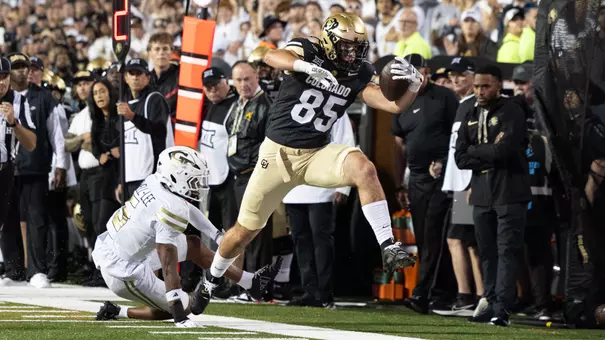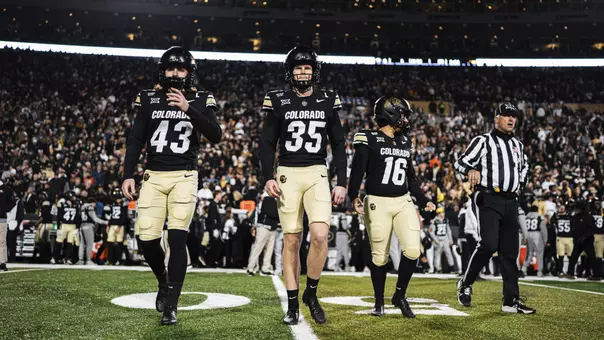Colorado University Athletics

Buffs Notes: Defense Climbs Nationally, Gold Games, Most Improved
November 07, 2016 | Football, Neill Woelk
Colorado improvement picks up where 2015 left off
BOULDER — One year after taking some significant steps forward on the defensive side of the ball, the Colorado Buffaloes have picked up in 2016 where they left off last year and then some, moving into the top 20 in the nation in a variety of key defensive categories.
CU coach Mike MacIntyre said the improvement is not a surprise. Throughout the preseason, MacIntyre said he saw the defense's improvement a year ago, and with the vast majority of those players returning, he expected another big step up.
"We've got a lot of good players on defense and they keep competing," MacIntyre said after last week's 20-10 win over UCLA. "I said (before the season) we should be in the top echelon of the Pac-12 and be one of the top 20 defenses in America. I believe that."
With three regular season games to go, defensive coordinator Jim Leavitt's crew is delivering what MacIntyre predicted. Heading into Saturday's 8 p.m. game at Arizona, the No. 16 (Associated Press) Buffs are ranked among the top defenses in the nation in a variety of categories. The list includes total defense (ninth), scoring defense (12th) and rushing defense (17th).
Some numbers within the numbers:
— Of the 59 FBS teams who have improved their total defense numbers this year, CU's defensive improvement is the best of the bunch thus far. Colorado is allowing just 296.9 yards per game this year, 120 yards less than a year ago. That improvement is slightly better than No. 2 Indiana, which has shaved 119.4 yards off its 2015 per game average.
— Colorado held UCLA to 210 yards total offense, making it the fourth time in the last five games CU has held an opponent under 275 yards, and the sixth time this season. Of all 64 Power Five schools, plus independents Notre Dame and BYU, the Buffs are just one of six teams that have held five or more opponents under 300 yards this season. Alabama has done it seven times, Louisville and Ohio State six times, and Florida, Michigan and Colorado all five times. (In their head-to-head matchup, both Colorado and Michigan surpassed the 300-yard mark).
— Over their current three-game winning streak (Arizona State, Stanford and UCLA), the Buffs have held opponents to an average of 224 yards per game and 10.3 points. Opponents have converted just 12 of 47 third-down tries in that stretch, with UCLA going 4-for-15 (after a 3-for-4 start).
— CU is tied for second in the nation in red zone defense, having allowed scores just 66.7 percent of the time. Out of 21 times penetrating the CU 20-yard line, opponents have scored three field goals and 11 touchdowns (six rushing, five passing).
And, of course, there are defensive takeaways. CU's defense has forced at least one turnover in 22 straight games, the longest such streak in the nation.
GOLD GAMES: When the season began, MacIntyre unveiled the CU season schedule in front of his team with a color code for the season.
The "black" games are finished.
Now the No. 16 (AP) Buffs are in the "gold" portion of the schedule — the games that become exponentially more important every week, the games that will determine where and when Colorado plays in its first postseason since 2007.
It is a November the 7-2 Buffs (5-1 Pac-12) want to remember for all the right reasons.
"This is what you want to do it for," head coach Mike MacIntyre said after Monday morning's practice. "The football part they came here for, is to be in these types of games so they can have all this experience."
The Buffs are 1-0 in the gold games after a 20-10 win Thursday over UCLA. Next on the schedule is an 8 p.m Saturday matchup at Arizona (FS1).
"We call these the gold games because this gets you gold," MacIntyre said. "We want to keep moving in that direction. We're 1-0 in our gold games and we want to make it 2-0 if we can."
The Buffs are clear favorites to do just that, as they face a 2-7 Arizona team that has lost six in a row, including Saturday's 69-7 drubbing at Washington State. The Wildcats haven't scored more than 14 points in their last three games while giving up 48, 34 and 69.
But, MacIntyre is still convinced the Buffs will get the Wildcats' best shot. He's reminded his players that Arizona has won four straight against Colorado, a streak that includes a 38-20 win two years ago in Tucson and last year's 38-31 win in Boulder that saw Arizona erase a 24-17 CU lead in the fourth quarter with 21 unanswered points.
"They have a good football team," MacIntyre said. "(The Buffs) know a lot of those guys are the same guys that beat us last year. No way that we will overlook them at all. They have a lot of good players."
And, should that not be enough to get the Buffs' attention, MacIntyre has already reminded them of this: the Wildcats opened Pac-12 play by taking Washington to overtime before finally falling, 35-28. It's as close as anyone has come to the No. 4 Huskies all season.
"That says enough right there," MacIntyre said. "Our kids know that and understand that."
MOST IMPROVED: Twice in its history, Colorado has finished a season as the nation's most-improved team. In 1985, the Buffs posted a 5½-game improvement (going from 1-10 in 1984 to 7-5 in 1985). In 2001, CU's 10-3 mark was a six-game improvement over the 3-8 record in 2000.
This year, the Buffs are just one of eight teams in the nation to win at least three more games than last year. The list includes UCF and Wyoming (plus-5), Eastern Michigan (plus-4), and Army, Colorado, North Texas, Troy and Wake Forest (plus-3).
Also, of the top 15 teams in last week's initial CFP rankings, only Colorado (4-9 last season) and Nebraska (6-7) had losing records a year ago.
TIE-BREAKER PROCEDURE: As the Pac-12 schedule heads down the final stretch, the chance of a two- or three-way tie for the Pac-12 South title certainly exists.
The Buffs, of course, can eliminate such an occurrence simply by winning out. Currently holding a 5-1 conference record, CU has a one-game lead in the loss column over both USC (5-2) and Utah (4-2). If the Buffs win their last three games, they can't be caught.
But in case a tie occurs:
A two-way tie is broken by head-to-head results. Thus, if the Buffs ended up in a tie with USC, the Trojans would earn the title by virtue of their 21-17 win earlier this season. If the Buffs end up in a tie with Utah, the title would go to whoever wins their Nov. 26 season finale in Boulder.
But it gets a little more complicated when it comes to three-way ties.
If, for example, all three teams ended up with 7-2 conference marks, it would end up being decided by a five-step tie-breaking procedure. The procedure would be applied to eliminate one of the three teams if possible and then use head-to-head results to break the tie between the remaining two. The tie-breaking procedure for multiple teams consists of:
1. Head-to-head (best record in games among the tied teams).
2. Record in games played within the division.
3. Record against the next-highest placed team in the division, proceeding through the division.
4. Record in common conference games.
5. Highest ranking by SportsSource Analytics following the last weekend of regular-season games.
Prior to this year, the fifth procedure in the list used the College Football Playoff rankings. But conference athletic directors earlier this fall voted to switch to SportsSource Analytics because of expediency.
If the conference had stayed with the CFP rankings, it would have meant three teams might have had to wait three days after the final regular season game when the rankings are released Nov. 29 to find out who won the title. That would have also left the winner just three days to prepare for the Dec. 2 Pac-12 championship game.
The SportsSource Analytics can be obtained much sooner, meaning the tie-break will be determined the same day of the final regular season games.
399 AND COUNTING: Last week's win over UCLA marked No. 399 for the Buffs in two areas.
One, it was Colorado's 399th all-time win at home, meaning the Buffs will have their first chance to hit 400 when they play host to Washington State on Nov. 19.
Two, it was the 399th straight CU game attended by Dave Plati, CU's sports information director. Plati will hit 400 on Saturday when the Buffs play at Arizona (8 p.m, FS1).
OLIVER HONORED: CU sophomore Isaiah Oliver was named the Pac-12 Conference Special Teams Player of the Week, the league office announced Monday. Oliver had a 68-yard punt return for a touchdown in CU's win over UCLA that sealed the win, scoring the final points of the game with 5:27 remaining in the fourth quarter. It was his first career punt return for a touchdown and the first by a Buffalo since Stephone Robinson brought one back 81 yards against Kansas in Boulder on Oct. 22, 2005.
In the game Oliver returned five punts for a total of 124 yards, which is the most return yards in a game by any Pac-12 player this season and the fourth-most of any FBS player. He is the first Buff to have over 100 yards in punt returns in a game since Josh Smith (4-108) against Eastern Washington on Sept. 6, 2008; it was the most yards since Roman Hollowell had 6-148 against Fresno State on Aug. 26, 2001.
His 42-yard return early in the third quarter set up a CU field goal that tied the game up at 10.
Additionally, Oliver had one tackle for a third-down stop in the game and two pass breakups while playing 32 snaps on defense.
WSU GAME TIME STILL UP IN AIR: The Pac-12 announced Monday that the Colorado-Washington State game is one of five being held for six-day notification for television/kickoff time arrangements. The game time announcement will be made no later than Sunday.
Contact: Neill.Woelk@Colorado.edu






